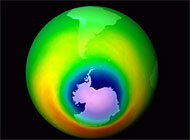Switzerland seeks more influence over Antarctica

Switzerland is seeking a greater say in how Antarctica is administered amid growing concerns about the continent's environmental health.
The relatively pristine wilderness of the frozen continent is threatened by global environmental change, the pressures of tourism and the ambitions of several countries.
Switzerland currently has observer status under the Antarctic Treaty, but is seeking to extend its influence to ensure Antarctica remains a demilitarised, nuclear free zone that is protected from the territorial ambitions of other countries.
This summer Bern is to apply for full membership of the Scientific Committee on Antarctic Research (SCAR) – the first stage in a lengthy process to become a consultative party to the Antarctic Treaty.
It also intends to ratify the Environmental Protocol of the Antarctic Treaty, which Switzerland signed in 1991. It states that Antarctica should only be used for peaceful scientific and educational purposes. It was designed to prevent the exploitation of Antarctica’s mineral resources.
Consultative status
At present, Antarctica is not owned by anyone. It is administered by 44 nations who are signatories to the Antarctic Treaty and its Environmental Protocol.
Twenty-seven countries are consultative parties, who control the decision-making process. The others, like Switzerland, are observers. To acquire consultative status, a country has to demonstrate its commitment to Antarctica by conducting significant scientific research there.
“It’s our intention to become a consultative party,” Antarctic specialist, Evelyne Gerber, at the Swiss foreign ministry, told swissinfo. “It’s a long process.
“Once we have applied for membership, we have to define a national programme in order to do substantive research. We also have to ratify the protocol on environmental protection in Antarctica.”
Harmony with foreign politics
Switzerland acceded to the Antarctic Treaty on November 15, 1990, nearly 30 years after it entered into force.
It promotes international scientific cooperation and holds all territorial claims – made by seven countries – in abeyance.
“The main principles of the treaty are in complete harmony with our foreign politics,” said Gerber.
Switzerland is currently involved in two significant scientific projects on the continent – ice core drilling to assess climate change over the past half a million years and a geological project dating the landscape.
Clean up operation
Tourism is a growing industry in Antarctica and the continent is currently visited by about 13,000 people a year. Scientists and environmental groups have begun to express their concerns about the effects of tourism on the continent.
Our correspondent, Vincent Landon, recently travelled to the Antarctic peninsula to observe the clean-up of a Russian research station.
Starting this week, swissinfo will be running a five-part series on his trip.
swissinfo

In compliance with the JTI standards
More: SWI swissinfo.ch certified by the Journalism Trust Initiative
You can find an overview of ongoing debates with our journalists here . Please join us!
If you want to start a conversation about a topic raised in this article or want to report factual errors, email us at english@swissinfo.ch.